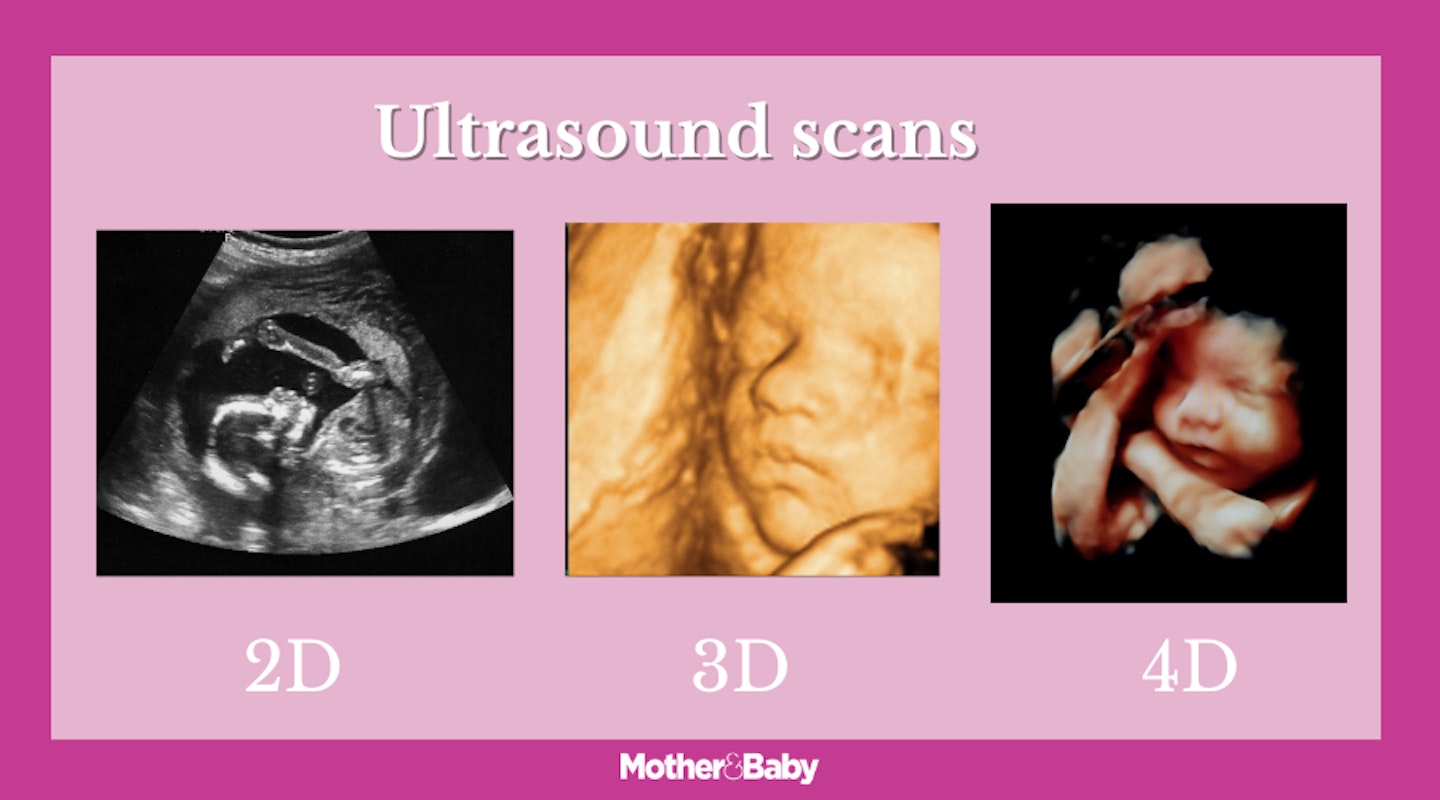When you go for your first 2D ultrasound baby scan, it's okay to feel a little disappointed at how blurry and fuzzy the image can look. That's why some mums prefer to have a 3D baby scan or in some cases a 4D baby scan to get a clearer image of your little one.
While you might be intrigued about the different kind of scans available to you, knowing the difference between what a 3D scan is and what a 4D scan is isn't all that clear. To help you get clued up about the different kinds of scans, we've done all the research for you and spoken to Dr Ayanthi Gunasekera, Senior Obs and Gynae Registrar and Medical Information Lead at London Gynaecology to help you decide what level of scan you might want.
What is the difference between 2D, 3D and 4D scans?
According to Dr Ayanthi, '3D scans show still pictures of your baby in three dimensions, while 4D ultrasound creates a live video. Like watching a movie, you can watch your baby smile or yawn.'

2D baby scan – This is the scan you'll get on the NHS as part of your regular maternity check ups at 12 weeks and around 20 weeks. The images are displayed in black and white and isn't all that clear because it also displays their internal organs rather than their skin. Although the image isn't all that clear, you'll be able to see if baby is growing and is healthy which is the most important thing. There is no risk to baby during this type of scan
3D baby scan – This scan will produce still images of baby and you'll be able to see their skin and facial features. Medical experts don't recommend having a 3D scan unless it's medically necessary as it exposes your baby to more ultrasound rays as these scans can take a while (45 mins to 1 hour).
4D baby scan – These show moving pictures of your baby rather than just stills and you can very clearly see their features. That's why they can provide more information about an abnormality such as a cleft lip for example. These scans can help doctors plan a treatment plan following the birth.
Overall, we'd recommend only having a 3D or 4D baby scan when it's medically advised or to gain more reassurance to avoid exposing your baby to too much ultrasound waves.
Are 3D baby scans safe?
According to the NHS, there are no known risks to the baby or the mother from having an ultrasound scan, but there are a few things you should consider before having a scan.
Dr Ayanthi says, 'Like 2D ultrasound which is used commonly in antenatal scanning, 3D and 4D ultrasound uses sound waves to create an image of your baby in your womb and is largely accepted as safe.'
As a general rule, qualified sonographers aim to use as little energy as possible when performing a scan to keep keep exposure to baby to a minimum. As 3D scans take longer, it's worth noting that your baby will be exposed to more ultrasound.
What reasons are there to have a 3d scan?
According to Dr Ayanthi, 'When used in conjunction with 2D ultrasound, 3D ultrasound can aid the earlier diagnosis of potential defects such as cleft lip or cleft palate, as well as neural tube defects like spina bifida, and skeletal malformations. Fetal medicine units use 3D scans when medically indicated. 3D and 4D scans can provide more information about a known abnormality and help doctors to plan treatment after delivery.
'You should not be having these tests done just to see your baby’s face. Ensure the person carrying out the ultrasound is a trained medical professional trained to pick up any abnormalities that may present. There is a cost implication to be considered as well.'
When is the best time to have a 3D baby scan?
It's best to have your 3D baby scan between 27 and 32 weeks of pregnancy. Before this point, baby's skin won't have enough fat in so their facial bones may show through. After the 32 week mark, baby's head may have started to fall into the pelvis in preparation for birth so you may not get a good view.
How much is a 3D baby scan?
As 3D baby scans aren't available on the NHS unless it's needed for a medical reason, you'll have to go private for these extra scans.
The cost for a 3D scan can vary depending on the clinic you go to and where you live. Currently on average, you can expect to pay anything between £85 and £250 per scan.
Expert written
This article contains expert advice from Dr Ayanthi Gunasekera, Senior Obs and Gynae Registrar and Medical Information Lead at London Gynaecology, the UK’s largest private gynaecology practice providing daily services to women.
